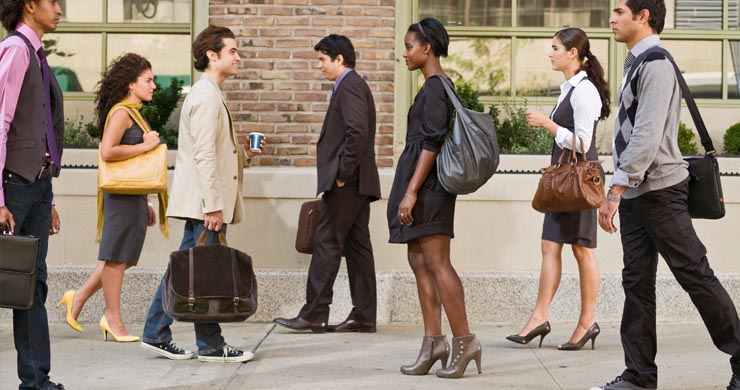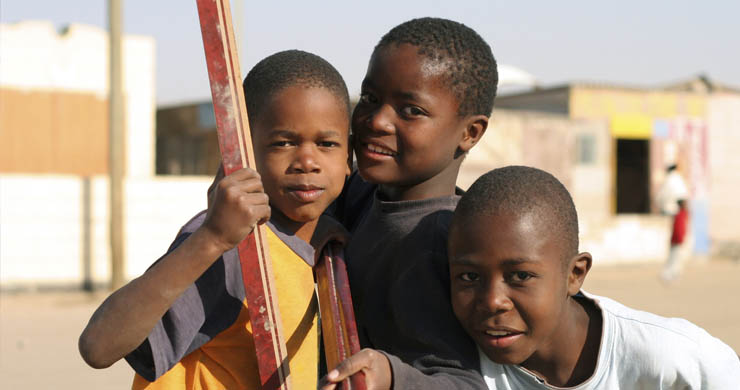Going bananas!
Do you think you could go bananas for Fairtrade Fortnight?
Fairtrade Fortnight 2010 will be held from 22 February - 7 March Why not take the Fairtrade quiz to see how much you already know about Fairtrade goods? To launch it, select the quiz button here! Good luck!
So, what is Fairtrade?
Farmers in developing countries often have difficulty getting a fair price for their produce when they trade with Western countries. For example, a company in the UK might pay a coffee farmer in Mexico a very low price for his coffee beans. This will result in the farmer becoming very poor.
Did you know?
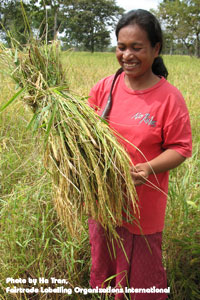
Trade means the buying or selling of either goods or services. The normal trading systems are dominated by big multinational companies who have become very powerful. These companies exist to make their owners (called share holders) as much money as possible. To do this they pay farmers and producers as little as they possibly can. The result is that the producers stay poor while the shareholders get richer.
Important words to know are:
Exports are goods sold by a country to another country (goods that leave). Imports are goods that are bought by a country (goods entering a country). Balance of Trade is the difference in value between imports and exports. A positive balance of trade is good for a country. Can you think why?
Did you know?
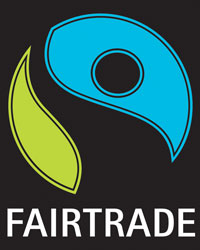
The FAIRTRADE Mark is a registered certification label for products sourced from producers in developing countries. Whenever you see this mark in the shops you know that usually at least 60% of the profits of the product have been received by the farmers/workers in developing countries. This is what the fairtrade label looks like.
‘Fairtrade’ means that farmers in these countries will be paid a better price for their goods so that they can earn a better living. It is a way of reducing poverty and increasing sustainable development.
You can spot fairtrade products by looking out for the fairtrade label on foods such as chocolate and coffee for example.
Where did Fairtrade labelling start?
Fairtrade labelling started in the Netherlands in 1988 on coffee that comes from Mexico. It started in the UK in 1994.
How does Fairtrade work?
For the Fairtrade system to work there has to be a partnership between a less economically developed country (LEDC) such as Uganda in Africa and a more economically developed country (MEDC) such as Wales.
Did you know?

An LEDC (Less Economically Developed Country) is a poorer country such as those in Africa.
An MEDC (More Economically Developed Country) is a rich country such as Wales.
LEDC + MEDC = a fairtrade partnership
How can companies buy Fairtrade goods?
There are two key parts to buying goods using the fairtrade method – the minimum price and the premium price:
What is the minimum price?
The minimum price is the lowest price that a buyer of Fairtrade products can pay a farmer. For example, a company that sells coffee in the UK would not be able to buy coffee beans for less than 80 pence per pound from a farmer in Mexico. This price is set to make sure that the farmer will always make a fair living from the sale of his goods.
It also means that the farmer will be able to afford to carry on harvesting the coffee beans without running out of money to do this.
If coffee is selling for more in the UK, can the buyer still pay the minimum price?
If coffee suddenly becomes more expensive in the UK, companies cannot demand to pay a lower price for the coffee beans. They must still pay £2 per bag of beans.
Can buyers suddenly change their contract with the farmers and pay less?
People who buy Fairtrade goods cannot suddenly decide to change their contracts with Fairtrade farmers. In fact, they must have long-term contracts with the Fairtrade farmers.
What is the premium price?
The Fairtrade premium price is extra money that is taken from the cost of the beans. This is to be spent on social, environmental or economic development projects. The workers can often decide how this money is spent. It is spent on education and healthcare, farm improvements to increase yield and quality, or processing facilities to increase income.
Case Study: Links with Wales -The Gumutindo Coffee Cooperative
The Gumutindo Coffee Cooperative has close links with Wales – it is an area of Uganda twinned with the Rhondda Cynon Taff in the South Wales Valleys. Members of Gumutindo will be in Wales to promote Fairtrade Fortnight 2010.
The Cooperative is made up of 3034 farmers. Most of the farmers grow around 0.2 hectares of coffee and nearly all of them are organic farmers. Many farmers who are not members of the Cooperative are trying to get their quality high enough so that they too can join.
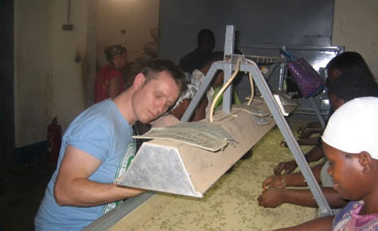
Mr. Gilbertson from Llanilltud Faerdref Primary School working in the Gumutindo Warehouse
Did you know?
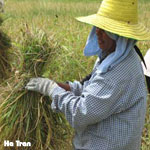
Improving Gender Equality and Women’s Empowerment
This is one of the Millennium Development Goals. Fairtrade cooperatives have become a very important way of achieving this.
Fairtrade cooperatives seek to enhance the role of women within their wider societies. Gumutindo cooperative is run by a committee made up of two people from each community cooperative. At least one of these must be a woman. This leads to women gaining greater experience of management thus creating more opportunities for advancement. Women are also paid directly for the work that they do and most farming on the land is often done by women. This might sound obvious to us in Wales but often in Africa the women produce the crops or products but then a man will sell and get paid. The women working directly in the Gumutindo cooperative earn between 80 pence and £1.20 a day which is about double what they would earn if they were working in a different job. Managers and supervisors earn more and many of these are women.
How did it begin?
The Coperative began by making a partnership with Twin Trading. This is a UK company that finds coffee farmers who want to be part of the Fairtrade scheme. In the UK, Cafédirect and Oxfam sell coffe from the Coffee Cooperative.
Where are the famers?
You can find the Gumutindo Coffee Cooperative in Eastern Uganda on the lower slopes of Mount Elgon.
Why farm here?
The fertile volcanic soil and subtropical climate in this area is ideal for growing high-quality arabica coffee. The farmers here have small farms, known as shambas.
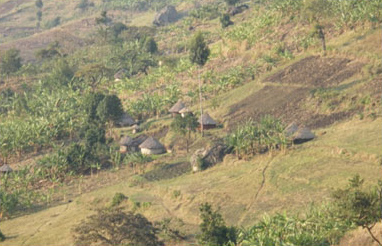
Shambas (farms) on Mount Elgon
Keeping the land fertile
The coffee is inter-cropped with food crops such as cassava, beans, bananas, sweet potato and avocado. This means that all of these crops are grown at the same time. This improves soil fertility, helps prevent soil erosion and provides shade for the coffee trees.
How do they farm the coffee?
At harvest time farmers pick the ripe red cherries from the coffee trees. The cherries are soaked in water and then fed through a hand-cranked pulping machine. This seperates the beans from the outer pulp. The beans are then laid out on racks to dry in the sun. The beans are now called parchment coffee, because of its dry, paper-like appearance. It is then sent to the Gumutindo warehouse for processing.
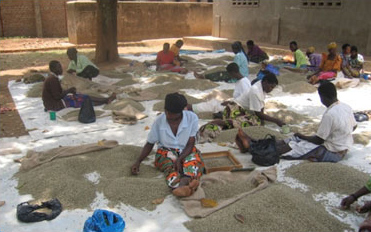
Women working at the Gumutindo Cooperative
How much are the farmers paid for their coffee?
Fairtrade buyers pay a guaranteed minimum price of 80 pence per pound. They are also paid extra money on top of this, at least 5 pence per pound. This is called a premium.
What happens to the extra (premium) money?
This money goes to a fund. The farmers decide how to invest the money. To date, these projects include:
-
Building and repairing coffee warehouses
-
Helping community projects such as schools, clinics, protecting natural water sources, constructing and repairing roads
What can you do for Fairtrade Fortnight 2010?
The theme for this years Fairtrade Fortnight is The Big Swap. The Fairtrade Foundation wants one million and one people to make a Fairtrade swap in this fortnight. There is a big focus on tea so can you get your parents or teachers to make a change to a Fairtrade tea? Don’t stop with just tea, can you swap to a Fairtrade chocolate? What about going Fairtrade bananas?
Project
You could devise a poster campaign to encourage swaps in your class, year group or whole school. Encourage people to register their swaps on the Fairtrade Foundation Website:

